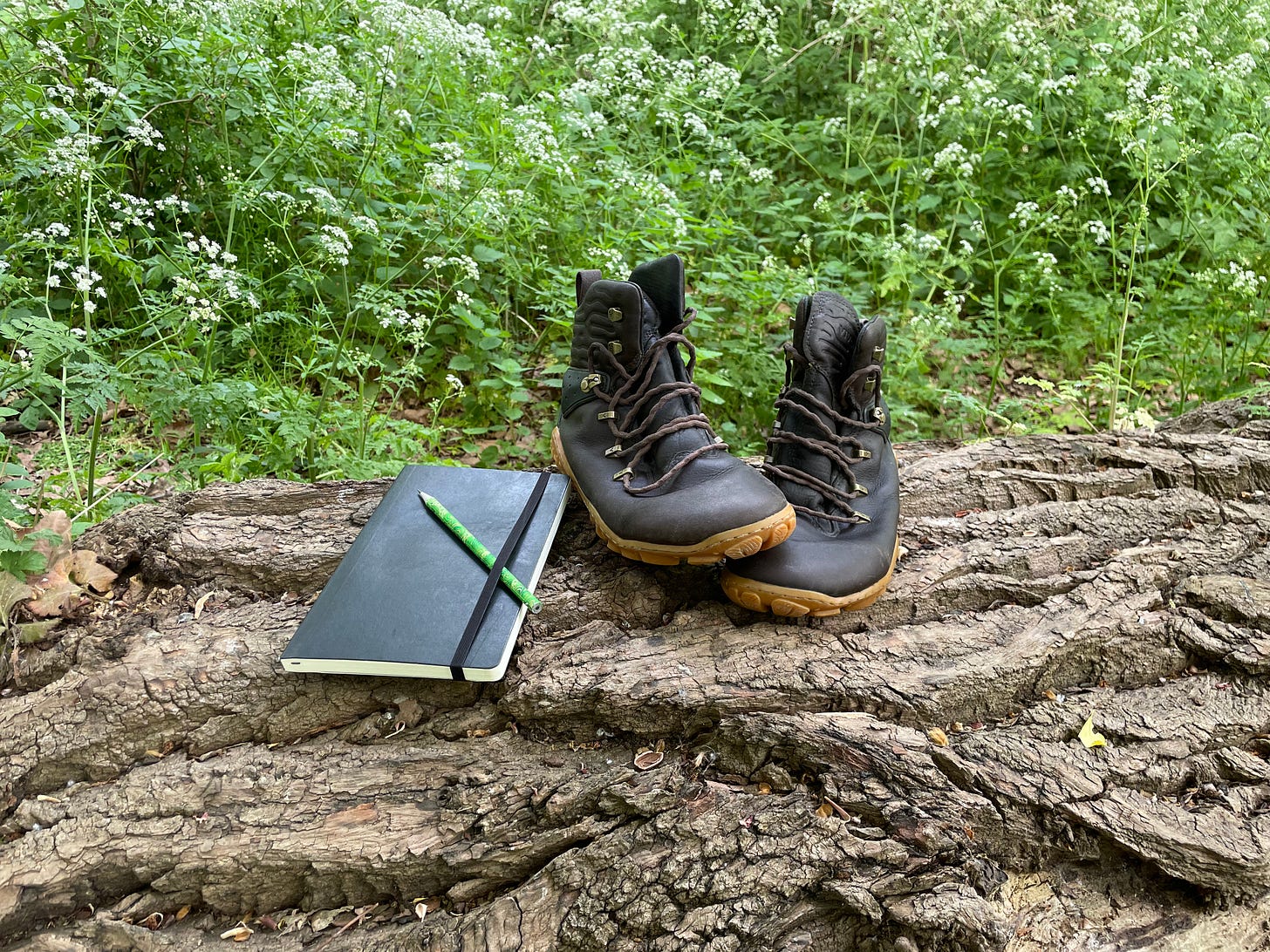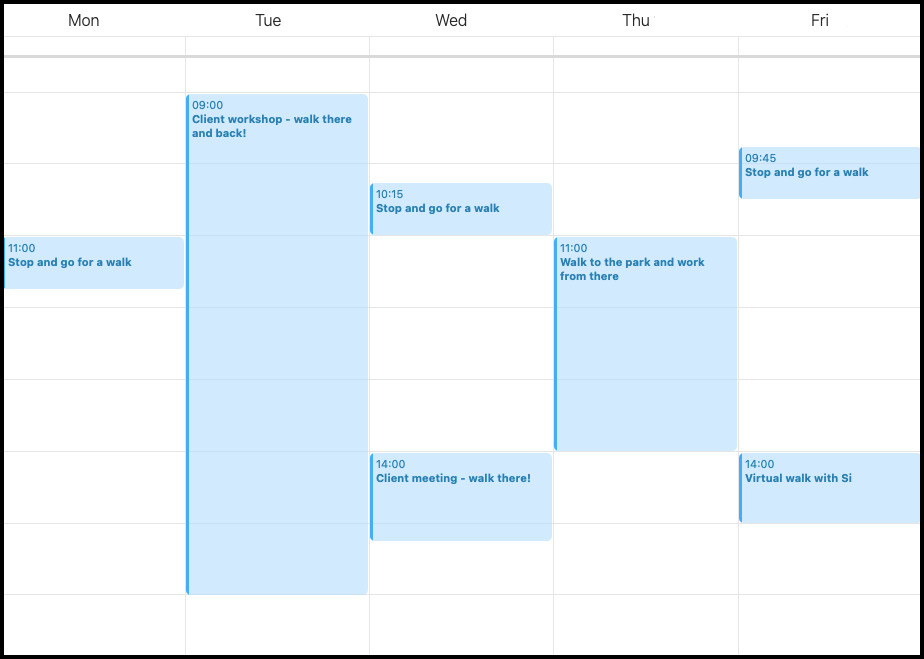Hello again. Thanks for all your lovely comments on Walking down the aisle. It's turned out to be one of the most popular posts I've written, so I guess you’re all keen to mix up your meals and spice up your sarnies.
Walking
Almost half of working adults in the UK worked from home during the pandemic.1 And even though many people have returned to their workplaces, having the flexibility to split your work time between home and the office remains popular, with the CIPD reporting that more than three quarters of employers are now offering hybrid working.2 But it’s not all plain sailing. The pandemic has shined a light on the pros and cons of home working for both employers3 and workers.4
I’m self-employed and I’ve been working from home for more than 13 years. Before that, I ran a dive shop – the kind of work you can only do in person – and when I started working from home I quickly discovered it wasn’t as easy as I’d thought it’d be. On the upside, I had fewer distractions, more flexibility and I didn’t have to wear shoes. On the downside, I missed working with other people, the lines between life and work began to blur and I hated being stuck indoors all day.
The last one proved to be rougher than I expected. Having worked outdoors for several years, being cooped up was really hard. I’d also switched from a job that kept me physically active to the sedentary work of a writer, which chained me to my desk for hours on end. Neither was good for my physical or mental health, so I found ways to help me make the most of the positives while tackling the negatives.
But there’s one thing that really helps me get into the mindset of working from home: I walk to – and from – work.
That’s it. It’s as simple as strolling around the block, grabbing some milk from the shops, or power walking around my nearest park. Sometimes my ‘commute’ takes 10 minutes. Sometimes it takes longer. The time doesn’t matter – it’s the effect that counts. Here’s why it helps me get ready for the day.
It forces me to get dressed
Sure, we could all lounge in our pyjamas all day and no one would know. But it’s hard to feel professional when you’re wearing a cartoon onesie. Wearing clothes you normally relax in can also blur the lines between your home and work life. So not only do I get dressed, I wear my ‘work’ clothes. Now, the work of a writer rarely calls for snazzy suits and sharp-heeled shoes, so I’m pretty casual and wear jeans most days. But I do have a bunch of tops that I only wear in the ‘office’. Having different work, home and going out-out clothes, creates a physical distinction between my home, work and social lives, which in turn helps me to separate them mentally.
It gives me the headspace, and thinking time, I used to get from commuting
It creates a physical break that allows me to switch between the person I am at home and the person I am at work. On my walk to work, I can look ahead to my day, think about what I have on my to-do list and make a plan. When I leave my flat in the morning I close the door on my home. And when I return a short time later, I open the door to my office.
The reverse is also true. Walking home from work lets me leave the job behind and switch off. Once I’m done for the day, I write the next day’s to-do list, I put my notebook away, clear my desk and that’s the end of work. When I leave my flat in the evening I’m closing the door on my office. And when I get back from my walk I open the door to my home.
It’s good exercise – both physically and mentally
I spend far too long sitting at my desk each day. A morning walk sets me up for the day, physically and mentally. And a walk home after a challenging day helps me to de-stress. And because I work alone, there’s no one to tell me to get off my arse and take a break during the day. So I’ve found ways to get out and about by walking to and from meetings whenever I can, and planning ‘walking breaks’ throughout the week.
And I have lots of other tips for working from home that don’t involve walking. Most of these are about creating self-discipline or drawing physical or mental boundaries between my work and home life.
Create a space inside your home just for work
A room or shed you can turn into an office or studio is perfect. I wish I had such luck. There are three rooms in my (tiny) flat. A bedroom, a bathroom and a single open space that serves the many roles of living room, dining room, kitchen and office. I’ve created ‘zones’ for each, because having physical boundaries helps me create mental ones. I’ve set up my office on the opposite corner of the room from my living area. It’s where my desk, laptop, printer, books and everything office-y live. I do not lounge about in my office and I never work from my sofa. My laptop lives on my desk. It has no business being anywhere else unless I’m taking it with me to a Real Life Meeting.Avoid working in your bedroom
I have a strict ‘no digital in the bedroom’ rule. I gave myself this gift after spending six months trying to work from my bed in a house I shared with other people. When I realised it was having a negative effect on my mental health I switched to working from the kitchen, by setting up a temporary desk on the table each day. I felt the benefits of this physical separation immediately and it’s now a rule I live by. If you don’t have a space you can use just for working, choose an area you can use as a workspace when needed, like the kitchen table, then clear all your work things away from it at the end of each day. If you have nowhere else to work from other than your bedroom, set up a desk or workspace away from your bed, if there’s room. For added privacy on video calls, use a background filter or blur effect. And to give yourself a mental break between using your bedroom for work, relaxing, sleeping (and sex), switch off your laptop and put it out of sight when you’re not working.Never host meetings at your home
I’ve never invited a client to my flat and I never will. I want my home to always be a safe and relaxing space, so I protect its sanctity. It’s also more professional and gets around any concerns about your liabilities if someone has an accident while inside your ‘office’.Get changed when you finish work
I’ve had a couple of jobs where I had to wear a uniform and the first thing I’d do when I got home after work was get changed. It’s a habit that stuck because ditching the work clothes and pulling on something comfy helps me to switch off. The reverse of that’s true – which is why I keep some clothes just for work.Decide what your working hours are and stick to them
I work weekdays and I’m a morning person, so I like to start before 8am so I can be finished by 5pm. In the summer I wake up even earlier, so I switch to ‘summer hours’ and start work at 6am most days so I can get outdoors for the afternoon. Having office hours gives me a mental split between home and work. Between 8am and 5pm I’m at work, outside these hours I’m at home.Use scent to change the ambience
This is my final and somewhat off-the-wall tip. Wear a perfume, cologne or aftershave just for work. Perfume is one of my indulgences. I have lots of them and I choose which ones to wear based on my mood, what I’m doing, where I’m going and who I’m with. I don’t really need to wear perfume when I’m working alone at home but I give myself a cheeky little spritz every morning. And I don’t know when I started doing it, but I recently noticed that I only wear one perfume when I’m working and I never wear it when I’m not. It’s BOSS Femme. How’s that for a bit of #girlbossing?
Hopefully you’ll find something useful among these tips. But my biggest invitation to you this time is to walk to work. And then walk home again. It really is as simple as that.
And if you don’t work from home, but want to build more walks into your day, then add a short walk to your commute. Get off the bus a stop early, or park your car a little further away, and walk the rest of the way.
Writing
Let’s try some reflective writing to explore the pros and cons of working from home. For this exercise, try to find examples that are specific to your working and living situation rather than coming up with a general list.
Write a list of all the cons of working from home
For each one, think of a way to either eliminate the issue, make it more manageable or balance it against a pro. For example, if you have too many Zoom calls and not enough time for your actual work, can you talk to your boss about it, or block your calendar with chunks of ‘focus time’, to prevent your coworkers booking you for meetings during those times? If you’re spending more on electricity can you balance this against what you save by not using your car or public transport?Write a list of all the pros of working from home
For each one, take a moment to feel grateful for it. It’s easy to focus on negatives and we sometimes forget to celebrate the positives, no matter how small they might be. Now take this a step further by thinking of ways to make the most of each positive. For example, if you gain 10 hours per week by not commuting, what else can you do with that time that has nothing to do with work? Like going to the gym, reading a book, or taking up a hobby you’ve always wanted to try.
I’m sure you’ll have many other tips for working from home and hopefully this writing exercise will help you discover more. I’d love to hear your ideas, so please share them with me, and the other readers of this newsletter, by adding them to the comments on this post.
Until then, happy walking and writing,
Sarah
Is hybrid working here to stay? Office for National Statistics, 23 May 2022
Three-quarters of employers now offer hybrid working but employers are split over whether it will last. The Chartered Institute of Personnel and Development, 27 June 2022
Advantages and disadvantages of employees working at home. nibusinessinfo.co.uk (from Invest Northern Ireland).
The pros and cons of working from home with valuable tips. Indeed.com, 13 April 2022





As someone who also works from home, I love this idea of making "commuting" part of my workday schedule. I live on a small island surrounded by a forest, which sounds ideal but in our winter of West Coast Canadian rain and more rain (and if we're lucky maybe two weeks of snow) my office can feel claustrophobic at times. Two of my tricks are to light a candle and plug in my essential oil diffuser because there is nothing like the smell of rosemary or thyme to gear up the creative juices.